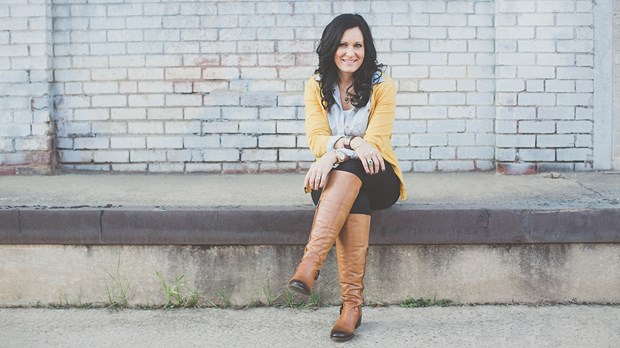How to Live a Full—Not Frantic—Life

Lysa TerKeurst knows a thing or two about battling a busy schedule. A bestselling author, speaker, mom of five, and president of Proverbs 31 Ministries, Lysa unpacks the deeper spiritual and relational costs of overcommitment in The Best Yes, casting a vision for how we can make practical choices that enable us to live a more discerning and healthy life. TCW connected with Lysa to hear her insights about those critical words, yes and no.
Why did you write The Best Yes?
When I set my life to the rhythm of rush, I don’t like who I am. I don’t feel like the best of me emerges—and I know I’m not alone in that tendency. How I set my schedule is how I live my life, and how I live my life is ultimately how I’m spending my soul. For me, when I live with the stress of an overloaded schedule, I ache with the sadness of an underwhelmed soul. Once I made that connection between an overwhelmed schedule and an underwhelmed soul, I recognized that it all came down to how I use two powerful words: yes and no.
I write about what I struggle with—and so I spent an intense amount of time studying and writing about my own journey so that I could invite other women into the possibilities of “the best yes” as well.
What are the real costs of living in a “rhythm of rush”?
From a physical standpoint, in terms of the human brain, when we live in a constant state of stress it actually inhibits the release of serotonin that God equipped us with to help stay in a stable place. Prolonged stress in our lives can actually lead to depression. So while stress in the short-term can be motivating or even slightly energizing, when stress becomes the pace of our lives, I just don’t think the best of who we are can emerge.
This is especially true for Christian women. We must not confuse the command to love with the disease to please. A lot of Christian women feel like saying yes to God means saying yes to everyone, saying yes to every opportunity. But that’s not what the command to love means. It doesn’t mean trying to please everyone or living at the mercy of everyone else’s requests. It means being a woman of love—and a woman of love has to have appropriate boundaries in her life so she can keep an attitude of love. It’s really hard to keep an attitude of love if we’re stressed, stretched, and pulled beyond reasonable limits.
How have you experienced this struggle in your own life?
I know that when I give the best of me to everyone outside of my home, the people inside my home get the worst of me—and that’s just not fair. Also, I’m task-oriented and have the propensity to gravitate toward projects—but God never said to us, “The ultimate sign that you know me is that you accomplish a lot.” No, instead God said the ultimate sign that we know him is that we love him and love people. As a task-oriented person, I need to remember that it’s people who must occupy the sacred spaces of my heart. Projects were never meant to occupy those sacred spaces.
So what does it really mean to live out a “best yes”?
The “best yes” means playing your part fully and completely. I want to help women discover that every moment of every day is an opportunity to discover or live out their calling. We have to leave space in our schedule for that to happen—and to leave space, we’re going to need to say no to something.
Saying no is not a rejection to the person we’re saying it to—no is a protection of our best yes. Once we start understanding how to properly use the words yes and no, we can start to discern what our best-yes answers really are.
Saying no can be hard and so often we make commitments for the wrong reasons. How can we discern between saying yes because of guilt or pressure and saying yes because of a real conviction that God is calling us to do so?
We really have to be honest with ourselves because there’s a difference between just saying yes to everyone and saying yes to God. Now, I’m not advocating that we become “no ninjas” in our churches or other environments. The focus of my book isn’t on no—it’s the best yes.
Philippians 1:9–10 is a great passage and it’s one of my favorites. It says, “And this is my prayer: that your love may abound more and more in knowledge and depth of insight, so that you may be able to discern what is best and may be pure and blameless unto the day of Christ.” This passage says so much about how we can learn to say yes to the right things and no to other things without the burden of guilt. This passage is centered in the idea that our love can abound more and more. We’re talking about the command to love, not the need to please.
This passage also discusses knowledge and insight. Knowledge is truth that we acquire. Every day the filter we process our decisions through has to be the truth from God’s Word. Depth of insight is something we get by living out that truth we have acquired. Once we’re in that rhythm of receiving the truth and then living out the truth in our lives, we’re enabled to discern what is best so that we can be pure and blameless—not guilt-ridden, not shame-filled—until the day of Christ.
In your book, you stress the importance of living in unbroken companionship with God and how that intimacy enables us to make discerning choices. What does unbroken companionship look like in your life?
For me, there are two parts to this. One is that every day I want to read at least one verse from God’s Word. That unbroken companionship comes as, throughout my day, I’m looking to apply the verse and make a connection between my time in God’s Word and the life I’m living that day. I’ve been doing this for years, and when you start looking at life through the filter of truth, you start seeing opportunities to apply that truth.
The second is that I’ve learned to see worry as a gift. The minute I start feeling worried about something, I see it as God’s trigger reminding me to pray. All throughout the day, if I worry about this or that, I’ll pray. That grows my unbroken companionship with God.
I love your goal: “living an unrushed yes.” Why is that daily choice so important?
When we set our lives to the rhythm of rush, we end up rushing everything in our lives—conversations, our prayer time, reading God’s Word, rushing from appointment to appointment—and we leave very little space to recognize God’s divine appointments. We may rush right past the purpose God has for us in our day. I don’t want to miss those anymore. I don’t want to miss connecting to those divine appointments in the in-between moments of life.
People may pick up The Best Yes and think, I’m going to read this book to get a better handle on my schedule. But this isn’t just about getting a better handle on your schedule—it’s about God getting a better handle on your soul.
Kelli B. Trujillo is editor of Today’s Christian Woman. Follow her on Twitter at @kbtrujillo and @TCWomancom.
Photo by Cheyenne Schultz
Read more articles that highlight writing by Christian women at ChristianityToday.com/Women
 Read These Next
Read These Next


 Great ExpectationsIt's fine to have them—as long as they are grounded in reality
Great ExpectationsIt's fine to have them—as long as they are grounded in reality
 Impatient with GriefTime does not always heal—and this, too, is hope.
Impatient with GriefTime does not always heal—and this, too, is hope.








 Homepage
Homepage


